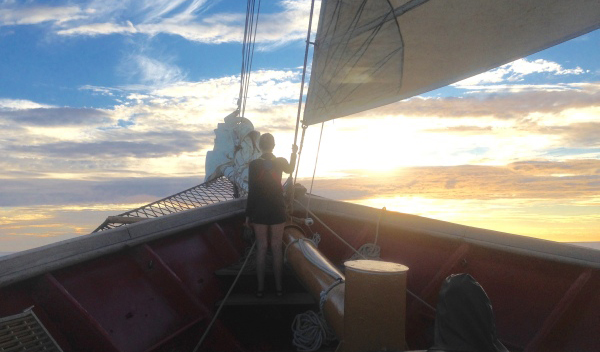Through Study Abroad, Wellesley Students Conduct Marine Research in the Atlantic Ocean

About 45 percent of Wellesley juniors choose to study abroad for a semester or a year, according to the Office of International Study. Though most students choose programs that allow them "to perfect a foreign language, conduct field research, or to gain a new perspective on their major" on dry land, others choose to pursue an adventure that's a little less landlocked.
Anthea Fisher '17 recently set sail with SEA Semester, a study abroad program that brings together undergraduates from around the country for six weeks of classes and research aboard a 134-foot brigantine. Before embarking on the journey, she spent five weeks doing preparatory coursework in the oceanographic research community of Woods Hole, Mass.
On the ship, students work rotating shifts as crew in addition to taking classes and doing research. Fisher, an economics major, who recently celebrated her 20th birthday aboard the SSV Corwith Cramer, wrote a blog post about her experience thus far, including "megafauna sightings"—pilot whales and dolphins—and about finally "finding her sea legs."
"Our goal is to provide a rigorous academic and physically challenging environment where everyone has to work together and is working toward their limits," said Virginia Land McGuire '92, SEA's associate dean of student services and financial aid. McGuire earned a BA in English and American studies at Wellesley before going on to earn a USCG Ocean Master’s License and EdM from Harvard University.
Helena McMonagle '16, a biological sciences major, sailed last year. "SEA programs are a great opportunity for character building and personal growth," she said. "I learned how to weather the storm when conditions were rough (literally and figuratively), how to work as a team when the safety and success of the cruise are absolutely dependent upon discipline and teamwork, and how to be a leader when the scientists and crew members began turning data collection, laboratory, and sailing responsibilities over to the students."
For McMonagle, who didn’t know the difference between tacking or gibing, a halyard or a sheet, before her SEA semester, the experience also gave her the chance to do important research on the "plastisphere" with three other shipmates, under the direction of SEA faculty.
"We've known for some time that plastic debris can be found out in the middle of the open ocean. I saw this with my own eyes at sea," said McMonagle. "What we’re still trying to understand is how this plastic impacts organisms that consume it (seabirds, turtles, even the fish we eat), and its potential to transport invasive species, pathogens, toxic algae, and other organisms that raft on this artificial substrate."
McMonagle is building her senior thesis on that research and continues to work with her SEA mentors.
McGuire said, "Students often tell us the experience was harder than they thought it would be, but they gained a new sense of themselves and what they can accomplish."
